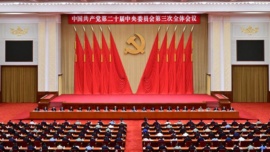In an interview with Macau Business, Professor Wenjin Kang, an expert in the application of fintech in asset pricing, anticipates promising prospects for the future of modern finance in Macau.
Macau Business | April 2024 | Special Report | Modern Finance

The Head of the Department of Finance and Business Economics at the University of Macau, emphasises that “Macau can strategically position itself as a hub for cross-border wealth management, attracting talent and investment flows from mainland China and overseas clients.”
Does Macau have the conditions to become attractive to fintech companies? What main conditions are these? What has changed in the last few years?
Wenjin Kang – Macau can leverage its unique strategic advantage based on the establishment of the Guangdong-Macau In-depth Cooperation Zone in Henqgin to enhance its appeal to fintech companies. This zone provides avenues for cross-border wealth management and other financial services, and fosters collaboration in fintech advancements (such as digital payment systems and blockchain applications). Recent developments, including the recently-signed Memorandum of Understanding on Fintech Innovation Supervisory Cooperation, have further cultivated a favourable environment for fintech growth.
Specifically, Macau can strategically position itself as a hub for cross-border wealth management, drawing talent and investment flows from mainland and overseas potential clients. This, in turn, enables fintech startups, investment advisors, and asset managers to tap into broader client bases and innovative financial technologies. Additionally, the Deep Cooperation Zone can promote fintech innovation by offering a regulatory sandbox — a controlled environment for testing novel financial technologies. By reducing entry barriers, this approach encourages new fintech innovations. Furthermore, streamlined cross-border regulations facilitate business operations and encourage adherence to consistent rules and compliance standards.
In brief, all these dynamic developments and opportunities mentioned above, combined with Macau’s strategic location and its integration into the Greater Bay Area’s financial ecosystem, offer significant opportunities for fintech companies that look for expansion and growth in this vibrant region.
From your point of view, what is the main reason why Macau needs Hengqin to develop its financial sector? Or, in other words, what advantages can Hengqin bring to Macau?
W. K. – Macau stands to gain significant advantages from its collaboration with Hengqin, particularly within the context of the Hengqin-Guangdong-Macau Deep Cooperation Zone. First, the Deep Cooperation Zone extends comprehensive support to financial enterprises, including licenced financial institutions and private equity funds. For example, the Financial Development Bureau within the Hengqin-Guangdong-Macau Deep Cooperation Zone has introduced innovative mechanisms to provide support and subsidies for financial institutions, especially those based in Macau. These incentives encourage them to establish and expand their operations within the zone. Second, the Deep Cooperation Zone strengthens Macau’s strategic positioning by aligning Macau-Hengqin integration together with the overall integration of the broader Greater Bay Area. Third, the Deep Cooperation Zone plays a pivotal role in boosting Macau’s fintech and wealth management businesses, as discussed earlier. In summary, the cooperation zone infuses fresh vitality into Macau’s long-term prosperity and serves as an essential platform for the future advancement of its finance sector.
“Macau’s wealth management sector is intricately tailored to the preferences of local investors, with products and services designed specifically for the needs of Macau residents and entities”

According to the current model, the wealth generated in Hengqin is not accounted for in Macau’s GDP. Do you think it’s important to address this?
W. K. – As for the thought of integrating Macau’s GDP with Hengqin, it presents a dynamic interplay of challenges and opportunities. Let’s explore both aspects as follows: First, the opportunities include the following: (a) Economic Synergy: By combining Macau’s robust sectors (tourism, entertainment, and finance) with Hengqin’s focus on research and development and high-tech manufacturing, a balanced and sustainable economic foundation can emerge, since this synergy capitalises on the strengths of both regions; (b) Diversification: Integrating with Hengqin allows Macau to diversify beyond gaming and tourism, and broadening the economic landscape mitigates risks associated with over-reliance on a single sector; (c) Talent Exchange: A unified approach can attract talents from both sides and foster an environment ripe for innovation and creativity, which, in turn, accelerates economic growth and technological advancement.
Next, the potential challenges include: (a) Infrastructure Integration: Achieving seamless economic cooperation necessitates integrating cross-regional infrastructure, transportation, and utilities, which requires significant investment and meticulous planning; (b) Population Movement: Attracting a sustainable population to Hengqin is essential but challenging, as providing quality housing, healthcare, and education and job opportunities becomes crucial and demanding in this process. Collaborative efforts are vital to address these challenges and pave the way for long-term prosperity in the Macau-Hengqin area.
Wealth management has developed a lot in Macau, but the funds allocated to this sector originate almost exclusively in Macau. How do you explain the ‘lack of interest’ of non-Macau investors?
W. K. – The potential lack-of-interest of non-Macau investors in Macau’s wealth management services can be attributed to the following factors. First, there is a concern related to market familiarity. Macau’s wealth management sector is intricately tailored to the preferences of local investors, with products and services designed specifically for the needs of Macau residents and entities. However, non-Macau investors, who may not be well-versed in the local market dynamics, could perceive these services as less aligned with their overall investment goals. Consequently, such unfamiliarity concern could deter non-Macau investors from considering wealth management services offered in Macau.
Secondly, Macau faces stiff competition in its wealth management sector, as Macau is an inherent part of the Guangdong-Hong Kong-Macau Greater Bay Area. As well-established and renowned financial centres in Asia, Hong Kong and Shenzhen enjoy a competitive advantage over Macau in terms of the reputation among its clients, the broadness of the existing customer base, and a diverse range of available investment tools. Therefore, it is important for Macau to find its own niche market in the wealth management business and thrive from there.
























